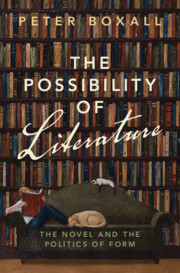Book contents
- The Possibility of Literature
- The Possibility of Literature
- Copyright page
- Dedication
- Epigraph
- Contents
- Figures
- Acknowledgements
- Introduction
- Part I On Writers
- Part II On Literary History
- Chapter 7 The Threshold of Vision
- Chapter 8 The Anatomy of Realism
- Chapter 9 Back Roads
- Chapter 10 Blind Seeing
- Chapter 11 Mere Being
- Part III On the Contemporary
- Notes
- Bibliography
- Index
Chapter 10 - Blind Seeing
Deathwriting from Dickinson to the Contemporary
from Part II - On Literary History
Published online by Cambridge University Press: 10 October 2024
- The Possibility of Literature
- The Possibility of Literature
- Copyright page
- Dedication
- Epigraph
- Contents
- Figures
- Acknowledgements
- Introduction
- Part I On Writers
- Part II On Literary History
- Chapter 7 The Threshold of Vision
- Chapter 8 The Anatomy of Realism
- Chapter 9 Back Roads
- Chapter 10 Blind Seeing
- Chapter 11 Mere Being
- Part III On the Contemporary
- Notes
- Bibliography
- Index
Summary
This essay traces a tradition of what is here called ‘deathwriting’ as it stretches from Emily Dickinson, to Franz Kafka, to Samuel Beckett, to Cormac McCarthy. The work of all these writers, the essay argues, is driven by the urge to give a poetic form to the experience of death, to make death thinkable and narratable. Alongside this tradition of deathwriting, and interwoven with it, one can discern too, a fascination with ‘blind seeing’, an attempt to make darkness visible, or to overcome the distinction between the light and the dark, the visible and the invisible. In reading the connection between deathwriting and blind seeing as it runs from Dickinson to the contemporary, the essay argues that these writers allow us to glimpse a differently constituted relationship between the living and the dead, and between the perceptible and the imperceptible. At a contemporary moment when it has become urgent to rethink our apparatuses for world picturing, with the emergence of the Anthropocene as a critical context for all of our imaginings, the essay offers this history of deathwriting as a radically different way of seeing, without the aid of human light.
Keywords
- Type
- Chapter
- Information
- The Possibility of LiteratureThe Novel and the Politics of Form, pp. 206 - 226Publisher: Cambridge University PressPrint publication year: 2024

